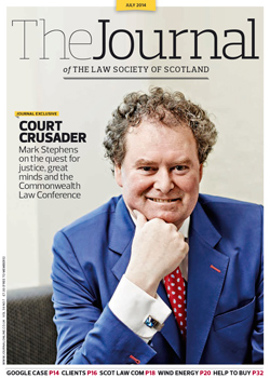National priorities

On 23 June 2014 the Scottish Government (SG) launched the Scottish Planning Policy (SPP) and the National Planning Framework 3 (NPF3). This article follows on from my briefing (Journal, January 2014, 25) which considered SG’s proposal to introduce a presumption in favour of “sustainable development” in national planning policy. That has now become a reality with the publication of SPP, which is of central importance to the planning system and planning decision-making.
SPP: priorities
SPP is a statement of SG’s priorities for the operation of the entire planning system and the development and use of land. It will be a material consideration (carrying significant weight) and must be taken account of in all planning decisions and appeals, and in all development plans (local and strategic). There are currently 10 development plan examinations taking place across the country which must now have immediate regard to SPP and NPF3.
A central purpose of the planning system is increasing and facilitating sustainable economic growth. This is defined as “building a dynamic and growing economy that will provide prosperity and opportunities for all, while ensuring that future generations can enjoy a better quality of life too”.
SPP is outcome focused, and introduces a presumption in favour of development that contributes to sustainable development. The presumption means that the “planning system should support economically, environmentally and socially sustainable places by enabling development that balances the costs and benefits of a proposal over the longer term”.
It is clear that the aim is to achieve the right development in the right place, and not to allow development at any cost. Development plans will require to reflect this presumption, and it will be an important consideration for plans being prepared or examined.
Though SPP is non-statutory, s 3D of the Town and Country Planning (Scotland) Act 1997 requires that functions relating to the preparation of the National Planning Framework and development plans by planning authorities must be exercised with the objective of contributing to sustainable development. SG is able to issue guidance under s 3E on this requirement to which planning authorities must have regard. The SPP is stated to be this guidance.
Where the development plan is out of date or does not contain policies relevant to the proposal in question, the policy presumption in favour of sustainable development will apply. It is a rebuttable presumption which requires a full assessment of the proposal and that there are no unacceptable impacts that would clearly outweigh the benefits when assessed against the SPP.
A number of guiding principles are set out in SPP that will be used to assess the sustainability of a proposal. These include:
- due weight to net economic benefit;
- responding to economic issues;
- good design;
- making efficient use of land;
- supporting delivery of accessible housing, business, retailing and leisure development;
- supporting delivery of infrastructure ;
- supporting climate change mitigation and adaptation;
- improving health and wellbeing;
- having regard to the principles for sustainable land use in the Land Use Strategy;
- protecting, enhancing and promoting access to cultural heritage, including the historic environment;
- protecting, enhancing and promoting access to natural heritage;
- reducing waste;
- avoiding over-development;
- considering the implications of development for water, air and soil quality.
For onshore wind farms, SPP confirms that they will not be acceptable in National Parks and National Scenic Areas.
NPF3: national developments
In tandem with the SPP, SG has laid NPF3 in the Scottish Parliament for the required 60-day period. It sets out SG’s development priorities over the next 20-30 years and identifies national developments which support the development strategy.
As with SPP, there is a strong focus on supporting sustainable economic growth and the intended transition to a low carbon economy. NPF3 sets out SG’s ambition for Scotland as a whole, and highlights the opportunities for sustainable growth in Scotland’s cities and towns, rural areas, and coast and islands. NPF3 must be taken into account in all strategic and local development plans in Scotland.
Fourteen national developments are identified to deliver the strategy:
- Ravenscraig;
- Dundee waterfront;
- carbon capture and storage network and thermal generation;
- high voltage electricity transmission network;
- pumped hydroelectric storage;
- Central Scotland Green Network;
- Metropolitan Glasgow Strategic Drainage Partnership;
- national long distance cycling and walking network;
- high speed rail;
- strategic airport enhancements;
- Grangemouth Investment Zone;
- freight handling capacity on the Forth;
- Aberdeen Harbour;
- national digital fibre network.
NPF3 contains a statement of SG’s reasons for considering that there is a need for the above developments or class of developments in the national interest. Once approved by the Scottish Parliament, it is considered that the needs case for these has already been made. While it does not confer consent for these developments, their designation in NPF3 as national developments means that there is a presumption that planning permission will be granted unless material considerations indicate otherwise.
In this issue
- “The Union and the law” revisited
- Cartels: raising the stakes
- The cooling-off catch
- Attack vectors into the law: smartphones
- Money laundering: the Fourth way
- Has Glasgow morality come to Edinburgh?
- Reading for pleasure
- Opinion: Graeme McCormick
- Book reviews
- Profile
- President's column
- 10-year target
- Headline act
- Forget that you ever knew me
- The cooling-off catch (1)
- Tax devolution: the legal implications
- Ninth life
- Planning: how does the wind blow?
- Going off the rails
- Employee shares? Sort them yourself
- Angostura, anyone?
- National priorities
- Scottish Solicitors' Discipline Tribunal
- People on the move
- Heart of the action
- Helping solicitors on Help to Buy
- Conditions countdown
- Where bullocks fear to roam
- Fit to grant?
- Controlling the risks
- Ask Ash
- Opening up the law
- From the Brussels office
- Law reform roundup
- Post-corroboration Review update






